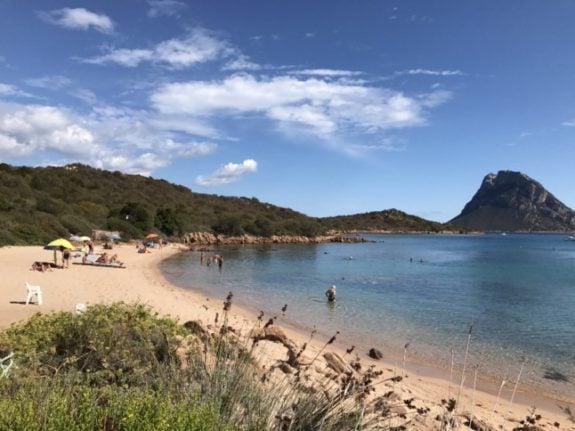A campaign group called ‘Sardegna rubata e depredata’ (Sardinia robbed and plundered) estimated that at least six tonnes of sand had been taken from the island’s beaches this year alone, mostly by foreign visitors.
In 2017, it became illegal to remove sand, shells and pebbles from Sardinia’s beaches as they were classed as protected resources. People breaking these rules face fines of between €500 and €3,000 – and anyone caught attempting to take larger quantities risks a prison term.
But it seems that many visitors haven’t got the message, as sand theft – and the number of fines being issued to those caught stealing – has risen again this summer with the return of international tourists.
READ ALSO: What is Italy doing to protect its coastline?
In July alone, customs officers at Sardinia’s Alghero airport seized 1.4 kilograms of sand from the island’s beaches during systematic bag searches, the Ansa news agency reported on Tuesday.
Items found in the possession of departing passengers at the airport last month reportedly included numerous plastic bottles filled with sand, 743 sea pebbles, 43 shells and a rock weighing 1.2 kg.
All passengers caught with the illegal souvenirs were fined, police said.
Campaigners said most culprits are foreign tourists who usually “don’t really have a motive”.
“Perhaps to arouse the envy of friends and relatives, or to recreate the feeling of the holiday in their living rooms, or even to decorate a home aquarium,” the group wrote on its Facebook page.
“Some do it probably because there is such a sense of discomfort in having to leave the island. They try in a desperate way to take it with them, in their hands, instead of keeping the memories in the heart,” the group said.
In rarer cases, the motive for the theft appears to be profit – with reports in Italian media that bags of precious pink sand from Sardinia’s protected beaches are being sold online to “collectors”.
A couple of French tourists last year were caught trying to board a ferry with 40kg of sand in 14 large plastic bottles in the boot of their car.



 Please whitelist us to continue reading.
Please whitelist us to continue reading.
Member comments